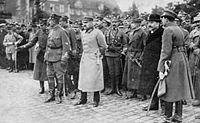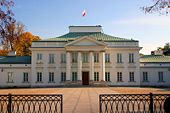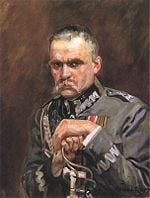Jozef Pilsudski
| Józef Klemens Piłsudski | |
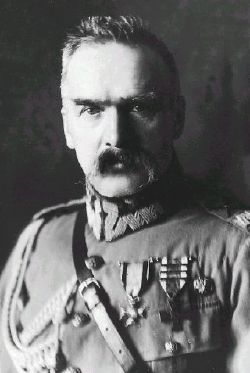
| |
Chief of State of the Republic of Poland
| |
| In office November 18, 1918 – December 9, 1922 | |
| Prime Minister | under President Ignacy Mościcki |
|---|---|
| Preceded by | independence |
| Succeeded by | President Gabriel Narutowicz |
| Born | December 5 1867 |
| Died | May 12 1935 (aged 67) Warsaw, Poland |
| Political party | None (Formerly PPS) |
| Spouse | Maria Piłsudska Aleksandra Piłsudska |
Józef Klemens Piłsudski (['juzɛf piw'sutski] ▶, December 5, 1867 – May 12, 1935) was a Polish statesman, Field Marshal, first Chief of State (1918–1922) and dictator (1926–1935) of the Second Polish Republic, as well as head of its armed forces. He was born into a noble family with traditions dating back to the Grand Duchy of Lithuania in the Polish-Lithuanian Commonwealth. From World War I until his death Piłsudski was a major influence on Poland's government and foreign policy, and an important figure in European politics.[1] He played a decisive role in Poland regaining her independence in 1918, 123 years after the last partitions of the Polish-Lithuanian Commonwealth in 1795.[2][3][4][5]
From his youth, Piłsudski desired the independence of the former Polish-Lithuanian Commonwealth. In his early political life, he was an influential member and later leader of the Polish Socialist Party. He considered the Russian Empire to be the most formidable obstacle to Polish independence, and worked with Austro-Hungary and Germany to ensure Russia's defeat in World War I. Later in the war, he withdrew his support from the Central Powers to work with the Triple Entente for the defeat of the Central Powers. After World War I, during the Polish-Soviet War (1919–1921), he was in charge of the 1920 Kiev Offensive and the Battle of Warsaw (1920). From November 1918, when Poland regained its independence, until 1922, he was Poland's Chief of State (Naczelnik Państwa).
In 1923, as the Polish government became dominated by Piłsudski's chief opponents, the National Democrats, he withdrew from active politics. Three years later, however, he returned to power in the May 1926 coup d'état, becoming de facto dictator of Poland. From then until his death in 1935, he concerned himself primarily with military and foreign affairs. To this day, Piłsudski is held in high regard by many Poles, considered by many to be a national savior.[6]
Biography
Early life
Józef Piłsudski was born December 5, 1867, at his family's manor in Zulovo (Polish: Zułów), in a district then part of the Russian Empire (now Zalavas, Lithuania). The area was part of the Grand Duchy of Lithuania, a component of the Polish-Lithuanian Commonwealth, before the latter was partitioned.[7] His szlachta family[8] cherished Polish patriotic traditions[7][9] and has been characterized either as Polish[10][11] or as Polonized Lithuanian;[12][8] [a]
Piłsudski attended the Russian Gymnasium in Vilna (modern Vilnius), but was not an especially diligent student.[13] His mother, Maria, née Bilewicz, introduced Piłsudski, along with his brothers Adam, Bronisław and Jan to Polish history and literature, although the books were suppressed by the Russian authorities.[14] His father, also named Józef, had fought in the January 1863 Uprising against the Russian occupation of Poland.[7]
In 1885 Piłsudski began medical studies at the University of Kharkov (Kharkiv, Ukraine), where he became involved with Narodnaya Volya, part of the Russian Narodniki revolutionary movement. In 1886 he was suspended for participating in student demonstrations.[7] He was rejected by the University of Dorpat (Tartu, Estonia), whose authorities had been informed of his political affiliations.[7] On March 22, 1887, he was arrested by Tsarist authorities on a false[15] charge of plotting with Vilna socialists to assassinate Tsar Alexander III. In fact Piłsudski's main connection to the plot was the involvement in it of his elder brother, Bronisław. Bronisław was sentenced to 15 years' hard labor (katorga) in eastern Siberia.[16]
Józef received a milder sentence: five years' exile in Siberia, first at Kirensk on the Lena River, then at Tunka.[7][16] As an exile, he was allowed to work in an occupation of his own choosing, and earned his living tutoring local children in mathematics and foreign languages[8] (he knew French, German and Lithuanian, in addition to Russian and, of course, his native Polish; he would later learn English as well).[17] Local officials decided that as a Polish noble he was not entitled to the 10-ruble pension received by most other exiles.[18]
While being transported in a prisoners' convoy to Siberia, Piłsudski was held for several weeks at a prison in Irkutsk. There he took part in what the authorities viewed as a revolt: after one of the inmates had insulted a guard and refused to apologize, he and other political prisoners were beaten by the guards for their defiance;[19] Piłsudski lost two teeth and took part in a subsequent hunger strike until the authorities reinstated political prisoners' privileges that had been suspended after the incident.[19] For his involvement, he was sentenced in 1888 to six months' imprisonment. He had to spend the first night of his incarceration in 40-degree-below-zero Siberian cold; this led to an illness that nearly killed him and to health problems that would plague him throughout life.[20] During his years of exile in Siberia, Piłsudski met many Sybiraks including Bronisław Szwarce, who had almost become a leader of the January 1863 Uprising.[21]
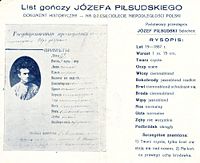
"State criminal
JÓZEF PIŁSUDSKI, nobleman
DESCRIPTION:
Age 19 (1887)
Height 1 meter, 75 cm.
Face clear
Eyes grey
Hair dark-blond
Sideburns light-blond, sparse
Eyebrows dark-blond, fused
Beard dark-blond
Mustaches light-blond
Nose normal
Mouth normal
Teeth missing some
Chin round
Distinctive marks:
1) clear face, with eyebrows fused over nose,
2) wart at the end of right ear"
In 1892 Piłsudski was allowed to return from exile. In 1893 he joined the Polish Socialist Party (PPS)[7] and helped organize its Lithuanian branch.[22] Initially he sided with the Socialists' more radical wing, but despite the socialist movement's ostensible internationalism he remained a Polish nationalist.[23] In 1894, as its chief editor, he began publishing a bibuła socialist newspaper, Robotnik (The Worker); he would also be one of its chief writers.[7][24] In 1895, he became a PPS leader, and took the position that doctrinal issues were of minor importance and that socialist ideology should be merged with nationalist ideology, as that combination offered the greatest chance of restoring Polish independence.
In 1899, while an underground organizer, Piłsudski married a fellow socialist organizer, Maria Juszkiewiczowa, née Koplewska, but the marriage deteriorated when several years later Piłsudski began an affair with a younger socialist,[23] Aleksandra Zahorska. Maria died in 1921, and in October that year Piłsudski married Aleksandra. They had two daughters, Wanda and Jadwiga, but this marriage was also troubled.
In February 1900, after the Russian authorities found Robotnik's underground printing press in Łódź, Piłsudski was imprisoned at the Warsaw Citadel but, after feigning mental illness in May 1901, he managed to escape from a mental hospital at Saint Petersburg with the help of a Polish physician, Władysław Mazurkiewicz, and others, fleeing to Galicia, then part of Austria-Hungary.[7]
On the outbreak of the Russo-Japanese War (1904–1905), in the summer of 1904, Piłsudski traveled to Tokyo, Japan, where he tried unsuccessfully to obtain that country's assistance for an uprising in Poland. He offered to supply Japan with intelligence in support of her war with Russia and proposed the creation of a Polish Legion from Poles,[25] conscripted into the Russian Army, who had been captured by Japan. He also suggested a "Promethean" project directed at liberating non-Russian ethnic communities living in the Russian Empire—a goal that he later continued to pursue.
Another notable Pole, Roman Dmowski, also traveled to Japan, where he argued against Piłsudski's plan, endeavoring to discourage the Japanese government from supporting at this time a Polish revolution which Dmowski felt would be doomed to failure.[26][25] Dmowski, himself a Polish patriot, would remain Piłsudski's political arch-enemy to the end of Piłsudski's life.[27] In the end, the Japanese offered Piłsudski much less than he had hoped for; he received Japan's help in purchasing weapons and ammunition for the PPS and its corganizationsation, while the Japanese declined the Legion proposal.[25][7]
In the fall of 1904, Piłsudski formed paramilitary units (the Combat Organization of the Polish Socialist Party, or bojówki) to create an armed resistance movement against the Russian authorities.[26] The PPS organized increasing numbers of demonstrations, mainly in Warsaw; on October 28, 1904, Russian Cossack cavalry attacked a demonstration, and in reprisal, during a demonstration on November 13, Piłsudski's paramilitary opened fire on Russian police and military.[28][26] Initially concentrating their attention on spies and informers, in March 1905 the paramilitary began using bombs to assassinate selected Russian police officers.[29]
During the 1905 Russian Revolution, Piłsudski played a leading role in events in Congress Poland.[26] In early 1905, he ordered the PPS to launch a general strike there; it involved some 400,000 workers and lasted two months until it was broken by the Russian authorities.[26] In June 1905, Piłsudski ordered an uprising in Łódź.[26] During the "June Days," as the Łódź uprising came to be known, armed clashes broke out between Piłsudski's paramilitaries and gunmen loyal to Dmowski and his National Democrats.[26] On December 22, 1905, Piłsudski called for all Polish workers to rise up; the call went largely unheeded.[26]
Unlike the situation with the National Democrats, Piłsudski instructed the PPS to boycott the elections to the First Duma.[26] The decision to boycott the elections and try to win Polish independence through uprisings caused tension within the PPS, and in November 1906, a part of the party split off in protest against Piłsudski's leadership.[27] Piłsudski's faction came to be called the "Old Faction" or the "Revolutionary Faction" (Starzy or Frakcja Rewolucyjna), while their opponents were known as the "Young Faction," "Moderate Faction" or "Left Wing" (Młodzi, Frakcja Umiarkowana, Lewica). The "Young" sympathized with the Social Democrats of the Kingdom of Poland and Lithuania and believed that priority should be given to cooperation with Russian revolutionaries in toppling the Tsarist regime and creating a socialist utopia in which negotiations for independence would be easier. Piłsudski and his supporters in the Revolutionary Faction continued to plot a revolution against Tsarist Russia[7] that would secure Polish independence. By 1909 Piłsudski's faction would again be the majority in the PPS, and Piłsudski would remain one of the most important PPS leaders up to the outbreak of the First World War.[30]
Piłsudski anticipated a coming European war and the need to organize the nucleus of a future Polish Army which could help win Poland's independence from the three empires that had partitioned her out of political existence in the late eighteenth century. In 1906, Piłsudski, with the connivance of Austrian authorities, founded a military school in Kraków for the training of paramilitary units.[27] In 1906 alone, the 800-strong paramilitaries, operating in five-man teams in Congress Poland, killed 336 Russian officials; in subsequent years, the number of their casualties declined, while the paramilitaries' numbers increased to some 2000 in 1908.[31][27]
World War I
At a meeting in Paris in 1914, Piłsudski presciently declared that in the imminent war, for Poland to regain her independence, Russia must be beaten by the Central Powers (the Austro-Hungarian and German Empires), and the latter powers must in their turn be beaten by France, Britain and the United States.[32] By contrast, Roman Dmowski, Piłsudski's rival, believed the best way to achieve a unified and independent Poland was to support the Triple Entente against the Triple Alliance.[33]

At the outbreak of World War I, on August 3, in Kraków, Piłsudski formed a small cadre military unit, the First Cadre Company, from members of the Riflemen's Association and Polish Rifle Squads.[34] That same day, a cavalry unit under Władysław Belina-Prażmowski was sent to scout across the Russian border, even before the official declaration of war between Austro-Hungary and Russia, which ensued on August 6.[35]
Piłsudski's strategy was to send his forces north across the border into Russian Poland, into an area which the Russian Army had evacuated, in the hope of breaking through to Warsaw and sparking a national uprising.[36] Using his limited forces, in those early days he backed his orders with the sanction of a fictitious "National Government in Warsaw,"[37] and bent and stretched Austrian orders to the utmost, taking initiatives, moving forward and establishing Polish institutions in liberated towns, while the Austrians saw his forces as good only for scouting or for supporting main Austrian formations.[38] On August 12, 1914, Piłsudski's forces took the town of Kielce, capital of Kielce Governorate, but Piłsudski found the populace less supportive than he had expected.[39]
On November 5, 1916, the Central Powers proclaimed the "independence" of Poland, hoping to increase the number of Polish troops that could be sent to the eastern front against Russia, thereby relieving German forces to bolster the western front.
Piłsudski agreed to serve in the "Kingdom of Poland" created by the Central Powers, and acted as minister of war in the newly formed Polish Regency government.[33] In the wake of the Russian Revolution and in view of the worsening situation of the Central Powers, Piłsudski took an increasingly uncompromising stance, insisting that his men not be treated as "German colonial troops" and only be used to fight Russia. Anticipating the Central Powers' defeat in the war, he did not wish to be allied with the losing side.[40] In the aftermath of a July 1917 "Oath Crisis" when Piłsudski forbade Polish soldiers to swear an oath of loyalty to the Central Powers, he was arrested and imprisoned at Magdeburg; the Polish units were disbanded, and the men were incorporated into the Austro-Hungarian Army,[7][36] while the Polish Military Organization began attacking German targets. Piłsudski's arrest greatly enhanced his reputation among Poles, many of whom began to see him as the most determined Polish leader, willing to take on all the partitioning powers.
On November 8, 1918, Piłsudski and his comrade, Colonel Kazimierz Sosnkowski, were released from Magdeburg and soon—like Vladimir Lenin before them—placed on a private train, bound for their national capital, as the increasingly desperate Germans hoped that Piłsudski would gather forces friendly to them.[36]
Rebuilding Poland
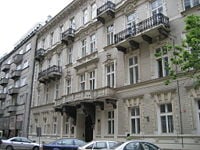
On November 11, 1918, in Warsaw, Piłsudski was appointed Commander in Chief of Polish forces by the Regency Council and was entrusted with creating a national government for the newly independent country; on that day (which would become Poland's Independence Day), he proclaimed an independent Polish state.[36] In that week he also negotiated the evacuation of the German garrison from Warsaw and of other German troops from the "Ober Ost" authority; over 55,000 Germans would peacefully depart Poland immediately afterwards, leaving their weapons to the Poles; over 400,000 total would depart Polish territories in coming months.[36][41] On November 14, 1918, he was asked to provisionally supervise the running of the country. On November 22 he officially received, from the new government of Jędrzej Moraczewski, the title of Provisional Chief of State (Naczelnik Państwa) of renascent Poland.[7]
Various Polish military organizations and provisional governments (the Regency Council in Warsaw, the government of Ignacy Daszyński in Lublin, and the Polish Liquidation Committee in Kraków) bowed to Piłsudski, who set about forming a new coalition government. It was predominantly socialist and immediately introduced many reforms long proclaimed as necessary by the Polish Socialist Party, such as the eight-hour day, free school education, and women's suffrage. This was necessary to avoid major unrest. However, Piłsudski believed that as head of state he must be above political parties,[36] and the day after his arrival in Warsaw, he met with old colleagues from underground days, who addressed him socialist-style as "Comrade" ("Towarzysz") and asked for support of their revolutionary policies. He declined to support any one party and did not form any political organization of his own; instead, he advocated creating a coalition government.[42] He also set about organizing a Polish army out of Polish veterans of the German, Russian and Austrian armies.
In the days immediately after World War I, Piłsudski attempted to build a government in a shattered country. Piłsudski and the first Polish government were distrusted in the West because Piłsudski had cooperated with the Central Powers in 1914–1917 and because the governments of Daszyński and Jędrzej Moraczewski were primarily socialist. It was not until January 1919, when the world-famous pianist and composer Ignacy Paderewski became prime minister and foreign minister of a new government, that it was recognized in the West.[36] That still left two separate governments claiming to be Poland's legitimate government: Piłsudski's in Warsaw, and Dmowski's in Paris. To ensure that Poland had a single government and to avert civil war, Paderewski met with Dmowski and Piłsudski and persuaded them to join forces, with Piłsudski acting as provisional president and supreme commander-in-chief while Dmowski and Paderewski represented Poland at the Paris Peace Conference.[43] Articles 87-93 of the Versailles Treaty[44] and the Little Treaty of Versailles, signed on June 28, 1919, formally established Poland as a sovereign and independent state on the international arena.[45]
On February 20, 1919, Piłsudski declared that he would return his powers to the newly elected Polish parliament (Sejm). However, the Sejm reinstated his office in the Little Constitution of 1919. The word "Provisional" was struck from his title, and Piłsudski would hold the office until December 9, 1922, when Gabriel Narutowicz was elected the first president of Poland.[7]
Polish-Soviet War
In the chaotic aftermath of World War I, there was unrest on all Polish borders. In 1918 in the east, Polish forces clashed with Ukrainian forces in the Polish-Ukrainian War, and Piłsudski's first orders as Commander-in-Chief of the Polish Army, on 12 November 1918, were to provide support for the Polish struggle in Lwów.[46] However, while Ukrainians were the first clear enemy, it soon became apparent that the various Ukrainian factions were not the real power in that region. The coming months and years would show that the Bolsheviks were, in fact, the most dangerous enemy not only of renascent Poland, but of the Ukrainians as well.
Piłsudski was aware that the Bolsheviks were no friends of independent Poland, and that war with them was inevitable.[47] He viewed their advance west as a major problem, but considered the Bolsheviks less dangerous for Poland than their Russian-civil-war contenders.[48] These "White Russians"—representative of the old Russian Empire—were willing to accept only limited independence for Poland, probably within borders similar to those of the former Congress Poland, and clearly objected to Ukrainian independence, which was crucial for Piłsudski's Międzymorze project.[49]
This was in contrast to the Bolsheviks, who proclaimed the partitions of Poland null and void.[50] Piłsudski thus speculated that Poland would be better off with the Bolsheviks, alienated from the Western powers, than with a restored Russian Empire.[48][51] By his refusal to join the attack on Vladimir Lenin's struggling Soviet government, by ignoring the strong pressures from the Entente Cordiale, Piłsudski helped to save the Bolshevik government in the summer and fall of 1919.[52]
In the wake of the Russian westward offensive of 1918–1919 and of a series of escalating battles which resulted in the Poles advancing eastward, on April 21, 1920, Marshal Piłsudski (as his rank had been since March 1920) signed a military alliance (the Treaty of Warsaw) with Ukrainian leader Symon Petliura to conduct joint operations against Soviet Russia. The goal of the Polish-Ukrainian treaty was to establish an independent Ukraine in alliance with Poland. In return, Petliura gave up Ukrainian claims to eastern Galicia, for which he was denounced by eastern-Galician Ukrainian leaders.[36] The Polish and Ukrainian armies, under Piłsudski's command, launched a successful offensive against the Russian forces in Ukraine. On May 7, 1920, with remarkably little fighting, they captured Kiev.[53]
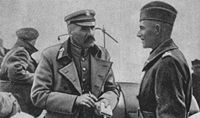
On July 1, 1920, in view of the rapidly advancing Soviet offensive, Poland's paliament, the Sejm, formed a Council for Defense of the Nation. It was chaired by Piłsudski and was to provide expeditious decision-making and temporarily supplant the fractious Sejm.[54] The National Democrats, however, contended that the string of Bolshevik victories had been Piłsudski's fault[55] and demanded that he resign; some even accused him of treason. Their July 19 failure to carry a vote of no-confidence in the council led to Roman Dmowski's withdrawal from it.[56] The Entente pressured Poland to surrender and enter into negotiations with the Bolsheviks. Piłsudski, however, was a staunch advocate of continuing the fight.[56] On August 12 he tendered his resignation to Prime Minister Wincenty Witos, offering to be the scapegoat if the military solution failed, but Witos refused to accept his resignation.[56]
Over the next few weeks, Poland's risky, unconventional strategy at the August 1920 Battle of Warsaw halted the Soviet advance.[53]
A National Democrat Sejm deputy, Stanisław Stroński, coined the phrase, "Miracle at the Vistula" ("Cud nad Wisłą"), to express his disapproval of Piłsudski's "Ukrainian adventure." Stroński's phrase was adopted as praise for Piłsudski by some patriotically or piously minded Poles, who were unaware of Stroński's ironic intent. A junior member of the French military mission, Charles de Gaulle, would later adopt some lessons from the Polish-Soviet War as well as from Piłsudski's career.[57]
In February 1921, Piłsudski visited Paris, where in negotiations with French president Alexandre Millerand he laid the foundations for the Franco-Polish Military Alliance that would be signed later that year.[58] The Treaty of Riga, which ended the Polish-Soviet War in March 1921, partitioned Belarus and Ukraine between Poland and Russia. Piłsudski called the treaty an "act of cowardice."[59] The treaty, and General Lucjan Żeligowski's capture of Vilna from the Lithuanians, marked an end to this incarnation of Piłsudski's federalist Międzymorze dream.
On September 25, 1921, when Piłsudski visited Lwów for the opening ceremony of the Eastern Trade Fair (Targi Wschodnie), he was the target of an unsuccessful assassination attempt by Stefan Fedak, a member of the Ukrainian Military Organization.[60]
Retirement and coup
After the Polish Constitution of March 1921 severely limited the powers of the presidency under the Second Polish Republic, Piłsudski refused to run for president. On December 9, 1922, the Polish National Assembly elected Gabriel Narutowicz of PSL Wyzwolenie; his election was opposed by the right-wing parties and caused increasing unrest.[61] On December 13, at the Belweder Palace, Piłsudski officially transferred his powers as Chief of State to Narutowicz; the Naczelnik was replaced by the President.[62]
After his inauguration, on December 16, 1922, Narutowicz was shot dead by a mentally deranged, right-wing, anti-Semitic painter and art critic, Eligiusz Niewiadomski, who had originally wanted to kill Piłsudski but changed his target when the non-right-wing president was elected.[63] For Piłsudski this was a major shock, an event that shook his belief that Poland could function as a democracy.[64] According to historian Norman Davies, Piłsudski believed in government by a strong hand.[65] Piłsudski became Chief of the General Staff and, together with Władysław Sikorski, Polish Minister of Military Affairs, managed to stabilize the situation, quelling unrest with a brief state of emergency.[66]
Stanisław Wojciechowski of PSL Piast was elected the new president, and Wincenty Witos, also of PSL Piast, became prime minister. But the new government—in the aftermath of the Lanckorona Pact, an alliance between the centrist PSL Piast and the right-wing National Populist Union and Christian Democrat parties—contained right-wing enemies of Piłsudski, people whom he held morally responsible for Narutowicz's death and whom he found it impossible to work with.[67] On May 30, 1923, Piłsudski resigned as Chief of the General Staff. After General Stanisław Szeptycki proposed that the military should be more closely supervised by civilian authorities, Piłsudski criticized this as an attempt to politicize the army, and on June 28 he resigned from his last political appointment. The same day, the Sejm's left-wing deputies adopted a declaration thanking him for his past work.[68] Piłsudski went into retirement in Sulejówek, outside Warsaw, at his modest country house which had been presented to him by his former soldiers. There he settled down to supporting his family by writing a series of political and military memoirs, including Rok 1920 (The Year 1920).[7]
Meanwhile Poland's economy was in shambles. Hyperinflation fueled public unrest. When the unpopular Chjeno-Piast coalition, which Piłsudski had strongly criticized, formed a new government, on May 12–14, 1926, Piłsudski returned to power in a coup d'état (the May Coup), supported by the Polish Socialist Party, Liberation, the Peasant Party, and even the Polish Communist Party.[69] Piłsudski had hoped for a bloodless coup, but the government refused to back down.[70] During the coup, 215 soldiers and 164 civilians were killed, and over 900 persons were wounded.[71] President Wojciechowski and Prime Minister Witos stepped down. Piłsudski, however, aware of the presidency's limited powers, refused to take office as president. His formal offices—apart from two terms as prime minister in 1926–28 and 1930—would for the most part remain limited to those of minister of defense and inspector-general of the Polish Armed Forces. He also served as minister of military affairs and chairman of the war council.[7]
Authoritarian rule
Piłsudski had no plans for major reforms; he quickly distanced himself from the most radical of his left-wing supporters, declaring that his coup was to be a "revolution without revolutionary consequences." His goals were to stabilize the country, reduce the influence of political parties, which he blamed for corruption and inefficiency, and strengthen the army.[72]
Internal politics
In internal politics, Piłsudski's coup entailed sweeping limitations on parliamentary government, as his Sanation regime (1926–1939)—at times employing authoritarian methods—sought to "restore [public life] to moral health." The powers of the Sejm were curtailed by constitutional amendments introduced soon after the coup, on August 2, 1926.[7] From 1926 to 1930, Piłsudski relied chiefly on propaganda to weaken the influence of opposition leaders. The culmination of his dictatorial and supralegal policies came in 1930 with the imprisonment and trial of certain political opponents on the eve of the 1930 Polish legislative elections, and with the 1934 establishment of a prison for political prisoners at Bereza Kartuska (today Biaroza), where some prisoners were brutally mistreated.
One of his main goals was to transform the parliamentary system into a presidential system; however, he opposed the introduction of a totalitarian system. The adoption of a new Polish constitution in April 1935, tailored by Piłsudski's supporters to his specifications—providing for a strong presidency—came too late for Piłsudski to seek that office; but this April Constitution would serve Poland up to the outbreak of World War II and would carry its Government in Exile through to the end of the war and beyond. Nonetheless, Piłsudski's government depended more on his charismatic authority than on rational-legal authority. None of his followers could claim to be his legitimate heir, and after his death the Sanation structure would quickly fracture, with Poland returning to the pre-Piłsudski era of parliamentary political contention.
Piłsudski's regime marked a period of much-needed national stabilization and improvements in the situation of ethnic minorities, which formed almost a third of the Second Republic's population. Piłsudski replaced the National Democrats' "ethnic-assimilation" with a "state-assimilation" policy: citizens were judged by their loyalty to the state, not by their nationality.[73] The years 1926–35, and Piłsudski himself, were favorably viewed by many Polish Jews, whose situation improved especially under the Piłsudski-appointed prime minister Kazimierz Bartel.[74][75]
In the military sphere, Piłsudski, who had shown himself an accomplished military strategist in engineering the "Miracle at the Vistula," has been criticized by some for subsequently concentrating on personnel management and allegedly neglecting modernization of military strategy and equipment.[76] His experiences in the Polish-Soviet War (1919–21) may have led him to overestimate the importance of cavalry and to neglect the development of armored forces and air force.[76] Others, however, contend that, particularly from the late 1920s, he did support the development of those branches of military.[77] The limitations on Poland's military modernization in this period may have been less doctrinal than financial.
Foreign policy
Under Piłsudski's direction, Poland had good foreign relations with some of its neighbors, notably the Kingdom of Romania, Hungary and Latvia. However, relations with Czechoslovakia were strained, and those with Lithuania were even worse. Relations with Weimar Germany and the Soviet Union (USSR) varied over time, but during Piłsudski's tenure could for the most part be described as neutral.[78][79]
Piłsudski, as Charles de Gaulle was later to do in France, sought to maintain his country's independence on the international scene. Assisted by his protégé, Minister of Foreign Affairs Józef Beck, he sought support for Poland in alliances with western powers, such as France and the United Kingdom, and with friendly, if less powerful, neighbors, such as Romania and Hungary. A supporter of the Franco-Polish Military Alliance and the Polish-Romanian Alliance (part of the Little Entente), he was disappointed by the French and British policy of appeasement evidenced in their signing of the Locarno Treaties.[79][80][81] Piłsudski therefore aimed to also maintain good relations with the USSR and Germany; hence Poland signed non-aggression pacts with both its powerful neighbors: the 1932 Soviet-Polish Non-Aggression Pact and the 1934 German-Polish Non-Aggression Pact. The two treaties were meant to strengthen Poland's position in the eyes of its allies and neighbors.[7] Piłsudski himself was acutely aware of the shakiness of the pacts, and remarked, "Having these pacts, we are straddling two stools. This cannot last long. We have to know from which stool we will tumble first and when that will be."[82]
Death
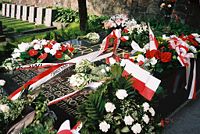
("A mother and the heart of her son") and bears evocative lines from a poem by Słowacki.
By 1935, unbeknown to the public, Piłsudski had for several years been in declining health. On May 12, 1935, he died of liver cancer at Warsaw's Belweder Palace. His funeral turned into a national tribute to the man who had done so much to restore Poland's independence. The celebration of his life had begun spontaneously within half an hour after his death had been announced.[83] It was led by military personnel, including former Legionnaires, members of the Polish Military Organization, veterans of the wars of 1919–21, and his political collaborators from his time as Chief of State and, later, prime minister.[2]
Legacy
On May 13, 1935, in accordance with Piłsudski's last wishes, Edward Rydz-Śmigły was named by Poland's president and government to be Inspector-General of the Polish Armed Forces, and on November 10, 1936, he was elevated to Marshal of Poland.[84] Rydz was now one of the most powerful people in Poland—the "second man in the state after the President."[85]
Piłsudski had given Poland something akin to what Henryk Sienkiewicz's Onufry Zagłoba had mused about: a Polish Oliver Cromwell. As such, the Marshal had inevitably drawn both intense loyalty and intense vilification.[86][87]
President Mościcki delivered a eulogy at Piłsudski's funeral in 1935: "He was the king of our hearts and the sovereign of our will. During a half-century of his life’s travails, he captured heart after heart, soul after soul, until he had drawn the whole of Poland within the purple of his royal spirit…. He gave Poland freedom, boundaries, power and respect." Yet after World War II, little of Piłsudski's thought influenced the policies of the Polish People's Republic, a de facto satellite of the Soviet Union.
After the fall of communism, Piłsudski came to be publicly acknowledged as a national hero.[6] On the sixtieth anniversary of his death, on May 12, 1995, Poland's Sejm issued a statement: "Józef Piłsudski will remain, in our nation's memory, the founder of its independence and the victorious leader who fended off a foreign assault that threatened the whole of Europe and its civilization. Józef Piłsudski served his country well and has entered our history forever." Nonetheless Piłsudski remains a controversial figure; he has been criticized by a number of prominent modern Poles, including the Polish historian and Minister of Foreign Affairs Bronislaw Geremek,[88] and by the Nobel Prize-winning author Czesław Miłosz.[89]
| Preceded by: Regency Council |
Head of State 1918–1922 |
Succeeded by: Gabriel Narutowicz |
| Preceded by: Kazimierz Bartel |
Prime Minister of Poland 1926–1928 |
Succeeded by: Kazimierz Bartel |
| Preceded by: Walery Sławek |
Prime Minister of Poland 1930 |
Succeeded by: Walery Sławek |
Notes
- ↑ Eva Plach. The Clash of Moral Nations: Cultural Politics in Pilsudski's Poland, 1926–1935. (Ohio University Press, 2006. ISBN 0821416952), 14
- ↑ 2.0 2.1 Marian Marek Drozdowski, Przedmowa, in Marian Marek Drozdowski, Hanna Szwankowska, Pożegnanie Marszałka: antologia tekstów historycznych i literackich, Oficyna Wydawnicza "Typografika," 1995, ISBN 8386417188, pp. 9–11.
- ↑ Anatol Lieven. The Baltic Revolution: Estonia, Latvia, Lithuania and the Path to Independence. (New Haven: Yale University Press, 1994. ISBN 0300060785), Google Print, p.159. books.google. Retrieved September 20, 2008.
- ↑ Jerzy Jan Lerski. Historical Dictionary of Poland, 966–1945. (Greenwood Press, 1996, ISBN 0313260079), Google Print, p.441 books.google. Retrieved September 20, 2008.
- ↑ Joseph Held. The Columbia History of Eastern Europe in the Twentieth Century. (New York: Columbia University Press, 1992. ISBN 0231076975), Google Print, p.249 Retrieved September 20, 2008.
- ↑ 6.0 6.1 Aviel Roshwald, Richard Stites. European Culture in the Great War: The Arts, Entertainment and Propaganda, 1914–1918. (Cambridge University Press, 2002, ISBN 0521013240), Google Books, p.60 Retrieved September 20, 2008.
- ↑ 7.00 7.01 7.02 7.03 7.04 7.05 7.06 7.07 7.08 7.09 7.10 7.11 7.12 7.13 7.14 7.15 7.16 7.17 (1867-1935),1972.html Józef Piłsudski (1867–1935).Poland.gov access April 23, 2006
- ↑ 8.0 8.1 8.2 Oleksa Pidlutskyi, "Postati XX stolittia," (Figures of the 20th century), (Kiev: 2004, ISBN 9668290011). Chapter "Józef Piłsudski: The Chief who Created Himself a State" reprinted in Zerkalo Nedeli (the Mirror Weekly), Kiev, February 3 – 9, 2001, Retrieved September 20, 2008.
- ↑ (Polish) Bohdan Urbankowski. Józef Piłsudski: marzyciel i strateg. (Józef Piłsudski: Dreamer and Strategist), tom pierwszy, vol. one, (Warsaw: Wydawnictwo ALFA, 1997, ISBN 8370019145), 13–15.
- ↑ Jerzy Jan Lerski. Historical Dictionary of Poland, 966–1945. (Greenwood Press, 1996. ISBN 0313260079), Google Print, p.449 Retrieved September 20, 2008.
- ↑ Norman Davies. God's Playground: A History of Poland in Two Volumes. vol. 2, (Oxford University Press, 2005. ISBN 0199253404), 40.
- ↑ Robert Bideleux, Ian Jeffries A History of Eastern Europe Crisis and Change. [1].} Retrieved September 20, 2008.
- ↑ Aviel Roshwald. Ethnic Nationalism and the Fall of Empires: Central Europe, the Middle East and Russia, 1914–1923. (Routledge, 2001. ISBN 0415242290), 36
- ↑ Margaret MacMillan. Paris 1919: Six Months That Changed the World. (Random House, 2003. ISBN 0375760520), 208.
- ↑ "Pilsudski, Józef Klemens," Microsoft Encarta. Retrieved September 20, 2008.
- ↑ 16.0 16.1 Urbankowski, 50
- ↑ Wacław Jędrzejewicz, Janusz Cisek. Kalendarium Życia Józefa Piłsudskiego. (Zaklad Narodowy im. Ossolińskich, 1994, ISBN 8304041146), 13
- ↑ Urbankowski, 71
- ↑ 19.0 19.1 Urbankowski, 62–66
- ↑ Urbankowski, 68–69
- ↑ Urbankowski, 74–77
- ↑ Urbankowski, 88
- ↑ 23.0 23.1 MacMillan, 209.
- ↑ Urbankowski, 93
- ↑ 25.0 25.1 25.2 Urbankowski, 109–111
- ↑ 26.0 26.1 26.2 26.3 26.4 26.5 26.6 26.7 26.8 Adam Zamoyski. The Polish Way. (London: John Murray 1987. ISBN 0531150690), 330
- ↑ 27.0 27.1 27.2 27.3 Zamoyski, 332.
- ↑ Urbankowski, 113–116
- ↑ Urbankowski, 117–118.
- ↑ Urbankowski, 131
- ↑ Urbankowski, 121–122.
- ↑ Hans Roos. A History of Modern Poland, from the Foundation of the State in the First World War to the Present Day. (New York: Alfred A. Knopf, 1966), 14. Translated by J.R. Foster from the German Geschichte der polnischen Nation, 1916–1960.
- ↑ 33.0 33.1 Zamoyski, 333.
- ↑ Urbankowski, 171–172
- ↑ Urbankowski, 168
- ↑ 36.0 36.1 36.2 36.3 36.4 36.5 36.6 36.7 THE REBIRTH OF POLAND University of Kansas, lecture notes by professor Anna M. Cienciala, 2004. Retrieved September 20, 2008.
- ↑ Urbankowski, 174–175
- ↑ Urbankowski, 178–179.
- ↑ Urbankowski, 170–171, 180–182.
- ↑ Urbankowski, 253.
- ↑ Urbankowski, 256 and 277–278
- ↑ Włodzimierz Suleja. Józef Piłsudski. (Wrocław: 2004, ISBN 8304047063), 202
- ↑ MacMillan, 213–214.
- ↑ See Articles 87-93 of the Treaty. Retrieved September 20, 2008.
- ↑ Thomas D. Grant. The Recognition of States: Law and Practice in Debate and Evolution. (Praeger/Greenwood, 1999. ISBN 0275963500) Google Print, p. 114. Retrieved September 20, 2008.
- ↑ Urbankowski, Vol 1, 281.
- ↑ Urbankowski, Vol. 2, 90
- ↑ 48.0 48.1 Peter Kenez. A History of the Soviet Union from the Beginning to the End. (Cambridge University Press, 1999. ISBN 0521311985), Google Books, p.37 Retrieved September 20, 2008.
- ↑ (Polish) Bohdan Urbankowski. Józef Piłsudski: marzyciel i strateg, (Józef Piłsudski: Dreamer and Strategist), Tom drugi (second volume), (Warsaw: Wydawnictwo ALFA, 1997. ISBN 8370019145), 83
- ↑ Urbankowski, op.cit., Pages 291
- ↑ Urbankowski, Vol 2, 45 (second tome)
- ↑ Urbankowski, 92 (second tome)
- ↑ 53.0 53.1 Norman Davies. White Eagle, Red Star: the Polish-Soviet War, 1919–20. (original 1972; reprint Pimlico, 2003, ISBN 0712606947)
- ↑ Urbankowski, Vol. 1, 341–346 and 357–58.
- ↑ Suleja, 265
- ↑ 56.0 56.1 56.2 Urbankowski, Vol. 1, 341–346.
- ↑ Norman Davies. Europe: A History. (HarperCollins, 1998, ISBN 0060974680), Google Books, p.935 Retrieved September 20, 2008.
- ↑ Urbankowski, Vol 1, 484.
- ↑ Davies, 1982, vol. 2, Google Books, p.399) Retrieved September 20, 2008.
- ↑ Urbankowski, Vol. 1, 485.
- ↑ Urbankowski, Vol. 1, 487–488.
- ↑ Urbankowski, Vol. 1, 488.
- ↑ Urbankowski, Vol. 1, 489
- ↑ Suleja, 300
- ↑ Norman Davies. 1984: Heart of Europe: A Short History of Poland. Oxford: Oxford University Press. ISBN 0-19-285152-7. Page 140: "Pilsudski believed that the world was ruled by brute force, and that fundamental changes could only be obtained, or essential interests defended, by the willingness to use violence, terror, and military power."
- ↑ Urbankowski, Vol. 1, 489–490
- ↑ Urbankowski, Vol. 1, 490–491
- ↑ Urbankowski, Vol. 1, 490
- ↑ Urbankowski, Vol. 1, 515
- ↑ Suleja, 343
- ↑ (Polish) Wojciech Roszkowski Historia Polski 1914–1991, Warszawa, 1992 ISBN 83-01-11014-7, pg 53 section 5.1
- ↑ Urbankowski, op.cit., Pages 528–529
- ↑ Timothy Snyder, The Reconstruction of Nations: Poland, Ukraine, Lithuania, Belarus, 1569–1999, Yale University Press, ISBN 030010586XGoogle Books, p.144 Retrieved September 20, 2008.
- ↑ Feigue Cieplinski, Poles and Jews: The Quest For Self-Determination 1919–1934, Binghamton Journal of History, Fall 2002, Last accessed on 2 June 2006.
- ↑ Paulsson, Gunnar S., Secret City: The Hidden Jews of Warsaw, 1940–1945, Yale University Press, 2003, ISBN 0300095465, Google Books, p. 37 Retrieved September 20, 2008.
- ↑ 76.0 76.1 Andrzej Garlicki, Jozef Pilsudski. 1867–1935. Scolar Press, 1995, ISBN. 1859280188, p.178
- ↑ Urbankowski, op.cit., vol.2, p. 30–337
- ↑ Urbankowski, Vol. 1, 538
- ↑ 79.0 79.1 Ilya Prizel. National Identity and Foreign Policy: Nationalism and Leadership in Poland, Russia and Ukraine. (Cambridge University Press, 1998. ISBN 0521576970), Google Books, p.71 Retrieved September 20, 2008.
- ↑ John Lukacs. The Last European War: September 1939-December 1941. (New Haven: Yale University Press, 2001. ISBN 0300089155) Google Books, p.30 Retrieved September 20, 2008.
- ↑ Nicole Jordan. The Popular Front and Central Europe: The Dilemmas of French Impotence 1918–1940. (Cambridge University Press, 2002. ISBN 0521522420), Google Books, p.23 Retrieved September 20, 2008.
- ↑ Jacob Kipp, (ed.), Central European Security Concerns: Bridge, Buffer, Or Barrier? (Routledge, 1993. ISBN 0714645451), Google Books, p. 95 Retrieved September 20, 2008.
- ↑ Zbigniew Wojcik, Przedmowa, in Marian Marek Drozdowski, Hanna Szwankowska, Pożegnanie Marszałka: antologia tekstów historycznych i literackich, Oficyna Wydawnicza "Typografika," 1995, ISBN 8386417188, p.5
- ↑ Marek Jabłonowski, and Piotr Stawecki. Następca komendanta. Edward Śmigły-Rydz. Materiały do biografii. (Wyższa Szkoła Humanistyczna w Pułtusku. 1998. ISBN 9390920808), 13
- ↑ Jabłonowski and Stawecki, 5
- ↑ Jeffrey C. Goldfarb. Beyond Glasnost: The Post-Totalitarian Mind. (University of Chicago Press, 1992. ISBN 0226300986), Google Books, p.152 Retrieved September 20, 2008.
- ↑ Zbigniew Wojcik, "Przedmowa," in Marian Marek Drozdowski, Hanna Szwankowska. Pożegnanie Marszałka: antologia tekstów historycznych i literackich. (Oficyna Wydawnicza "Typografika," 1995. ISBN 8386417188), 6
- ↑ Henry Kamm, Eastern Europe's Historians, Now Free, Face New Burden, The New York Times, March 24, 1991. Retrieved September 20, 2008.
- ↑ Czesław Miłosz, The History of Polish Literature. (New York, Macmillan, 1969), Google Print, p. 383 Retrieved September 20, 2008.
ReferencesISBN links support NWE through referral fees
- (Polish) Czubiński, Antoni, ed., Józef Piłsudski i jego legenda. Państowe Wydawnictwo Naukowe, 1988. ISBN 8301078197
- Davies, Norman. Europe: A History. HarperCollins, 1998. ISBN 0060974680
- __________. God's Playground: A History of Poland in Two Volumes. vol. 2, Oxford University Press, 2005. ISBN 0199253404.
- __________. Heart of Europe, the Past in Poland's Present. Oxford University Press, (1984) 2001. ISBN 0192801260
- __________. Heart of Europe: A Short History of Poland. Oxford: Oxford University Press, USA, 1986. ISBN 0192851527
- __________. White Eagle, Red Star: the Polish-Soviet War, 1919–20. (original 1972); reprint Pimlico, 2003, ISBN 0712606947
- Dziewanowski, M. K. Joseph Pilsudski: A European Federalist, 1918–1922. Stanford, CA: 1969. ISBN 9780817917913
- (Polish) Garlicki, Andrzej. Jozef Pilsudski, 1867–1935, abridged ed. Scolar Press, 1995. (Polish edition, 1990), ISBN 1859280188
- Goldfarb, Jeffrey C. Beyond Glasnost: The Post-Totalitarian Mind. University of Chicago Press, 1992. ISBN 0226300986
- Grant, Thomas D. The Recognition of States: Law and Practice in Debate and Evolution. Praeger/Greenwood, 1999. ISBN 0275963500
- Hauser, Przemysław. "Jozef Pilsudski's Views on the Territorial Shape of the Polish State and His Endeavorss to Put them into Effect, 1918–1921," Polish Western Affairs 2 (1992): 235–249, trans. Janina Dorosz. Poznan, ISSN 0032-3039
- Held, Joseph. The Columbia History of Eastern Europe in the Twentieth Century. New York: Columbia University Press, 1992. ISBN 0231076975.
- Jabłonowski, Marek, and Piotr Stawecki. Następca komendanta. Edward Śmigły-Rydz. Materiały do biografii. Wyższa Szkoła Humanistyczna w Pułtusku. 1998. ISBN 9390920808
- Jędrzejewicz, Wacław. Pilsudski: a Life for Poland. Hippocrene Books, 1982. ISBN 0882546333
- (Polish) Jędrzejewicz, Wacław. Józef Piłsudski 1867–1935. Wrocław: 1989. ISBN 8388736256
- Jordan, Nicole. The Popular Front and Central Europe: The Dilemmas of French Impotence 1918–1940. Cambridge University Press, 2002. ISBN 0521522420
- Kenez, Peter. A History of the Soviet Union from the Beginning to the End. Cambridge University Press, 1999. ISBN 0521311985
- Kipp, Jacob, ed., Central European Security Concerns: Bridge, Buffer, Or Barrier? Routledge, 1993. ISBN 0714645451
- Lerski, Jerzy Jan. Historical Dictionary of Poland, 966–1945. Greenwood Press, 1996. ISBN 0313260079
- Lieven, Anatol. The Baltic Revolution: Estonia, Latvia, Lithuania and the Path to Independence. New Haven: Yale University Press, 1994. ISBN 0300060785
- Lukacs, John. The Last European War: September 1939-December 1941. New Haven: Yale University Press, 2001. ISBN 0300089155
- Miłosz, Czesław. The History of Polish Literature. New York, Macmillan, 1969.
- (Russian)(Ukrainian) Pidlutskyi, Oleksa. Postati XX stolittia., (Figures of the 20th century), Kiev:, 2004. ISBN 9668290011, LCCN 20-04440333. Chapter "Józef Piłsudski: The Chief who Created Himself a State" reprinted in Zerkalo Nedeli (the Mirror Weekly) (Kiev) (February 3–9, 2001), in Russian
- Piłsudska, Aleksandra. Pilsudski: A Biography by His Wife. New York: Dodd, Mead and Co., 1941. OCLC 65700731
- Piłsudski, Józef, and Darsie Rutherford Gillie. Joseph Pilsudski, the Memories of a Polish Revolutionary and Soldier. Faber & Faber, 1931. OCLC 2219582
- Jozef Pilsudski, Year 1920 and its Climax: Battle of Warsaw during the Polish-Soviet War, 1919–1920, with the Addition of Soviet Marshal Tukhachevski's March beyond the Vistula. New York: Jozef Pilsudski Institute of America, 1972. ISBN B0006EIT3A
- Plach, Eva. The Clash of Moral Nations: Cultural Politics in Pilsudski's Poland, 1926–1935. Ohio University Press, 2006. ISBN 0821416952
- (Polish) Polski Słownik Biograficzny (Polish Biographical Dictionary), Zeszyt 109 (T. XXVI/2): 311–324.
- Prizel, Ilya. National Identity and Foreign Policy: Nationalism and Leadership in Poland, Russia and Ukraine. (Cambridge University Press, 1998. ISBN 0521576970), Google Books, p.71 Retrieved September 20, 2008.
- Reddaway, W. F., Marshal Pilsudski. Routledge, 1939. OCLC 1704492
- Rothschild, Joseph. Pilsudski's Coup d'Etat. New York: Columbia University Press, 1967. ISBN 0231029845
- Suleja, Włodzimierz. Józef Piłsudski. Wrocław: 2004, ISBN 8304047063
- (Polish) Bohdan Urbankowski. Józef Piłsudski: marzyciel i strateg. (Józef Piłsudski: Dreamer and Strategist), tom pierwszy, vol. one, (Warsaw: Wydawnictwo ALFA, 1997. ISBN 8370019145
- Wandycz, Piotr S.. "Polish Federalism 1919–1920 and its Historical Antecedents," East European Quarterly Boulder, CO: IV (1)(1970): 25–39. ISSN 0012-8449
- (Polish) Wójcik, Włodzimierz. Legenda Piłsudskiego w Polskiej literaturze międzywojennej. (Piłsudski's Legend in Polish interwar literature), Warszawa: 1987, ISBN 8321605338
- Zamoyski, Adam. The Polish Way. London: John Murray 1987. ISBN 0531150690
External links
All links retrieved September 7, 2022.
- Marshal Jozef Pilsudski. Messiah and Central European Federalist by Patryk Dole
- (English)/(Polish) Jozef Pilsudski Institute of America
- (English) Abbreviated version of biography.
| ||||||||||||||
Credits
New World Encyclopedia writers and editors rewrote and completed the Wikipedia article in accordance with New World Encyclopedia standards. This article abides by terms of the Creative Commons CC-by-sa 3.0 License (CC-by-sa), which may be used and disseminated with proper attribution. Credit is due under the terms of this license that can reference both the New World Encyclopedia contributors and the selfless volunteer contributors of the Wikimedia Foundation. To cite this article click here for a list of acceptable citing formats.The history of earlier contributions by wikipedians is accessible to researchers here:
The history of this article since it was imported to New World Encyclopedia:
Note: Some restrictions may apply to use of individual images which are separately licensed.




